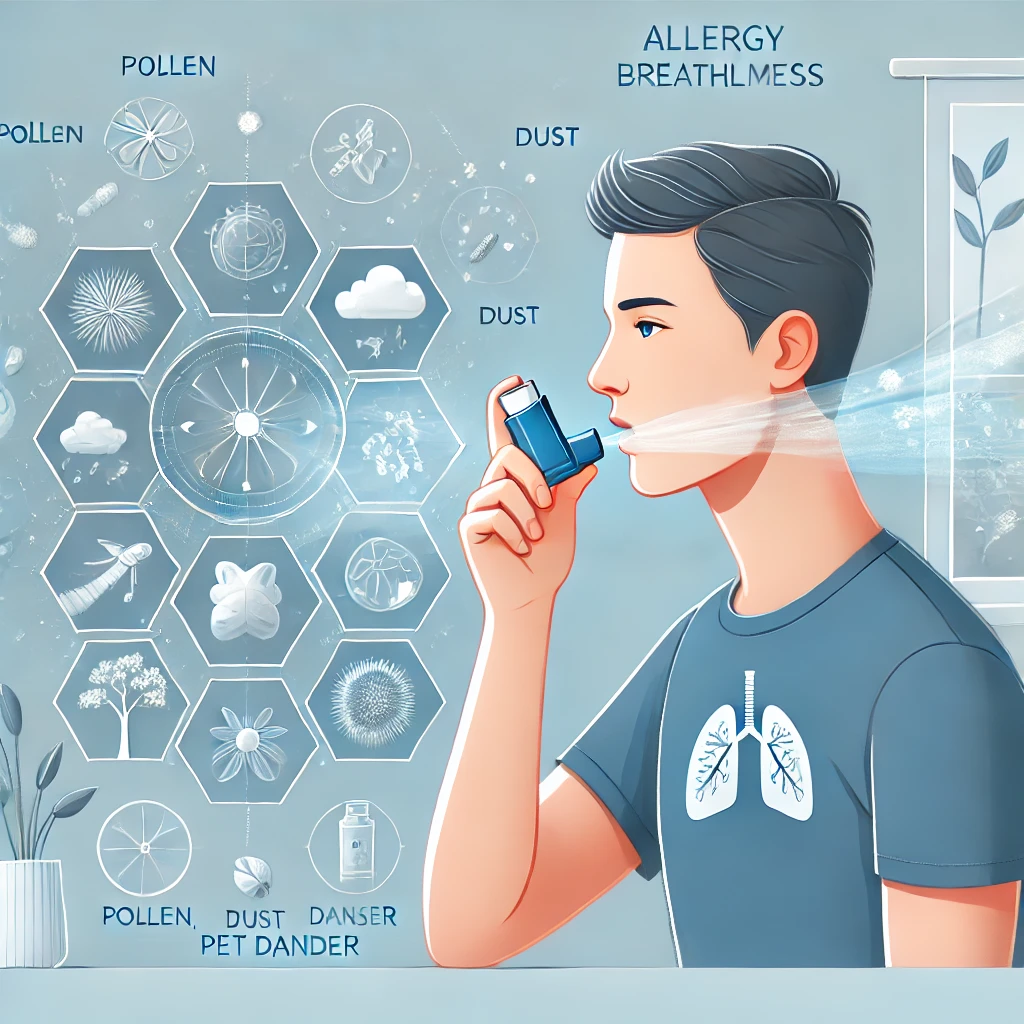Breathlessness, or shortness of breath, is a common symptom that many people experience, often linked to various underlying health conditions. One such condition that can lead to allergy breathlessness is an allergic reaction. For those who suffer from allergies, allergy breathlessness can cause significant distress, especially if left untreated. In this blog, we will explore what allergy breathlessness is, its causes, and how it can be managed effectively.
What is Allergy Breathlessness?
Allergy breathlessness refers to the difficulty in breathing caused by an allergic reaction, typically involving the respiratory system. When the body comes into contact with an allergen—such as pollen, dust mites, or pet dander—the immune system overreacts, releasing chemicals like histamine. This can lead to inflammation in the airways, causing symptoms like wheezing, coughing, and difficulty breathing.
People with asthma, for example, may experience worsening symptoms when exposed to allergens. The result is often a feeling of tightness in the chest and increased breathlessness. While the underlying cause is an allergy, the symptoms can mimic those of asthma, making it important to properly diagnose the condition.
Common Causes of Allergy Breathlessness
Several allergens are known to trigger allergy breathlessness, and understanding what these are can help individuals take preventive measures. Some common causes include:
- Pollen: Seasonal changes bring an increase in pollen in the air, which can be a major trigger for people who suffer from hay fever or allergic rhinitis.
- Dust Mites: These tiny creatures are commonly found in bedding, carpets, and upholstery, and their presence can cause allergic reactions leading to breathlessness.
- Pet Dander: Proteins found in animal skin cells, saliva, and urine can lead to allergic reactions in some people, causing respiratory issues.
- Mold: Mold spores are present in damp environments, and exposure can lead to respiratory problems, including allergy breathlessness.
By understanding the specific allergens that trigger breathlessness, individuals can avoid exposure and take steps to manage their condition.
Symptoms of Allergy Breathlessness
The symptoms of allergy breathlessness can range from mild to severe, depending on the individual and the severity of the allergic reaction. Common symptoms include:
- Shortness of breath
- Wheezing
- Chest tightness
- Coughing, especially at night or in the morning
- Rapid breathing
- Difficulty speaking in full sentences
In more severe cases, an individual may experience an asthma attack triggered by an allergic reaction, which can require immediate medical attention.
How Allergy Breathlessness is Diagnosed
If you experience allergy breathlessness, it is important to seek medical attention for proper diagnosis. A healthcare provider will likely perform a physical examination and review your medical history. They may also recommend the following:
- Allergy Testing: Skin tests or blood tests can help identify specific allergens that are causing your symptoms.
- Spirometry: This test measures the function of your lungs and helps diagnose asthma or other breathing conditions.
- Peak Flow Monitoring: This involves using a device to measure how fast you can exhale air, helping doctors assess your airway function.
With these diagnostic tools, healthcare providers can determine whether allergy breathlessness is the result of an allergy, asthma, or another condition, ensuring the correct treatment plan is implemented.
Treatment Options for Allergy Breathlessness
Managing allergy breathlessness typically involves a combination of avoiding allergens and using medications to alleviate symptoms. Some treatment options include:
- Allergy Medications: Antihistamines, nasal sprays, and decongestants can help reduce the body’s allergic response, alleviating symptoms like wheezing and nasal congestion.
- Inhalers: For people with asthma, bronchodilator inhalers can help open up the airways, making breathing easier during an allergic reaction.
- Corticosteroids: These medications can reduce inflammation in the airways, helping to manage chronic allergy symptoms and asthma.
- Immunotherapy (Allergy Shots): If you have a severe allergy, allergy shots may help desensitize your body to specific allergens over time, reducing your symptoms.
In addition to medication, lifestyle changes such as regular cleaning, using air purifiers, and staying indoors on high pollen days can help reduce exposure to allergens.
Managing Allergy Breathlessness at Home
There are several steps you can take at home to reduce the severity of allergy breathlessness:
- Create an Allergen-Free Environment: Regularly clean your home, wash bedding in hot water, and use hypoallergenic pillows and mattresses.
- Use Air Purifiers: Installing an air purifier can help remove allergens like dust, pet dander, and pollen from the air.
- Stay Hydrated: Drinking plenty of fluids can help keep your airways moist, making it easier to breathe.
- Monitor Pollen Counts: On days when pollen counts are high, try to stay indoors and keep windows closed.
For more personalized advice and management strategies, it’s best to consult with a healthcare provider who specializes in respiratory issues.
Contact Us for Expert Care
If you or a loved one is struggling with allergy breathlessness, it’s important to seek professional help for proper diagnosis and treatment. At Interstate Pulmonary, our team of experts is here to provide you with the best care tailored to your needs. Don’t wait to feel better—reach out to us today and get the help you deserve.
